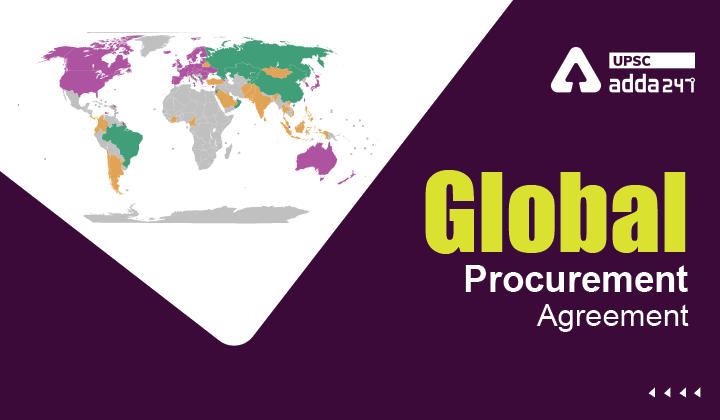Table of Contents
Agreement on Government Procurement UPSC: Relevance
- GS 2: Bilateral, regional and global groupings and agreements involving India and/or affecting India’s interests.
WTO Agreement on Global Procurement: Context
- Recently, the Ministry of Commerce and Industry has informed that India has no plans to join the Government Procurement Agreement of the World Trade Organization (WTO).
Government Procurement Agreement : Key points
- The India-UAE FTA agreement, which came into effect on 1 May excludes government procurement for several union ministries.
- This was the first time India had included government procurement in a free-trade pact, however, it is only limited to a few central ministries.
- It excludes key sectors such as construction, infrastructure projects and health care, including medical devices and pharmaceutical products.
- Under the India UAE pact, only government procurement contracts worth over ₹200 crore will be allowed for UAE-based companies on the same terms as Indian firms.
- Moreover, Government procurement is open to 34 ministries and departments, including power and education.
Agreement on government procurement (GPA)
- What is GPA: The GPA is a plurilateral agreement within the framework of the WTO, meaning that not all WTO members are parties to the Agreement.
- The fundamental aim of the GPA is to mutually open government procurement markets among its parties.
- As a binding international treaty, the GPA is administered by the Committee on Government Procurement which is composed of representatives of all its parties.
WTO government procurement India
- India is an observer under WTO Agreement on government procurement since 2010.
- Earlier, India never took up government procurement for bilateral or multilateral trade agreements in order to protect domestic firms.
- This was one of the bottlenecks in several key FTA negotiations, including the one with the EU.
Should India join GPA?
Yes because
- International market access: It would help India in promoting and reinforcing good governance practice as well as contributing to the effective management of the public resource and promoting convergence in international procurement systems.
- Minimization of inefficiency: Since GPA promotes competition through transparency, it could do away with the inefficiencies like lack of effective competition in bidding markets; and concerns regarding corruption or lack of good governance.
- Good governance: GPA includes transparency rules and provisions on domestic review to good governance and anti-corruption efforts in order to avoid conflicts of interest and prevents corruption practices.
No because
- Higher cost: Low development of India’s procurement system could imply higher costs for bringing institutional reforms to make it GPA-compliant.
- GPA requirements: Implementing GPA’s requirements regarding the transparency of procurement procedures, the implementation of an independent domestic review system, would mean a big change in the internal government structure through the implementation of reforms to its national legislation and procurement policies.
Government Procurement Agreement : Way forward
- Accession to GPA involves many advantages. Nevertheless, it is important to take into consideration the present structure and procurement policies before joining any such groupings.
Read current affairs for UPSC





 TSPSC Group 1 Question Paper 2024, Downl...
TSPSC Group 1 Question Paper 2024, Downl...
 TSPSC Group 1 Answer key 2024 Out, Downl...
TSPSC Group 1 Answer key 2024 Out, Downl...
 UPSC Prelims 2024 Question Paper, Downlo...
UPSC Prelims 2024 Question Paper, Downlo...




